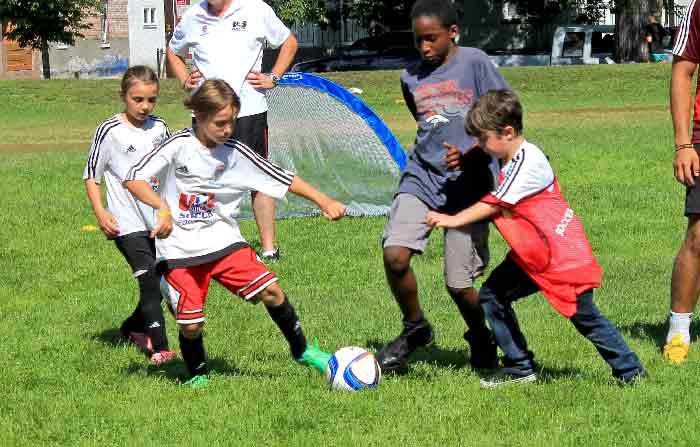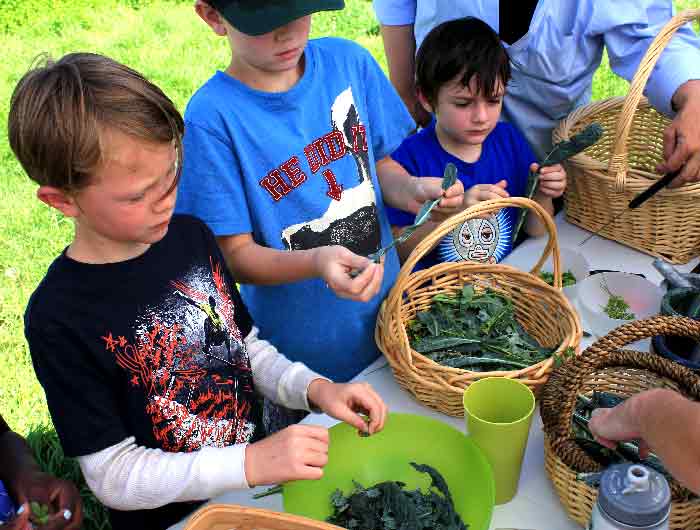Fellowship through Soccer and Gardening
Posted by: Melanie Stritch | Program Manager
What do soccer and gardening have in common? In our Soccer for Success program at The Colorado Rapids Youth Soccer Club, these two topics go hand in hand with our mission to promote healthy lifestyles in underserved communities. We focused on the four main components of physical activity, family engagement, mentorship and nutrition to hit score big on the field and in our very urban garden.
The Scrimmage
Every week on Thursday mornings the Near Northeast camp of Soccer for Success met at Mestizo-Curtis Park, with their game faces ready. Each Thursday is “game day” so all players have an opportunity to put the skills they have learned to use. We have created many different styles of scrimmage so that each player gets equal playtime and more touches on the ball. The camp spends the first hour of the day playing sessions continuously from start to finish. Coach mentors lead the teams through this physical component of Soccer for Success while families cheer from the sidelines. After a cool down and five big gulps of water, the camp takes a walk to the garden.

The Garden
Miss Cheryl, the master gardener greets us at the Community Garden. Miss Cheryl educates and guides the camp through the gardening portion of our day. Over the summer, the garden has truly sprung to life with everything from zucchini and tomatoes to sunflowers and marigolds. We repurposed donated bike rims from Chocolate Spokes into trestles for the tomato garden. These trestles will help the tomatoes grow high and sturdy over time. Some plants have been strategically placed to assist other plant types to grow. For example, basil is key in a tomato garden because it is a natural pesticide to protect tomatoes from bugs that will destroy their growth.
There are a variety of stations in the garden to guide the camp through a variety of activities, including; composting, making farm-to-table pesto, building more beds, and of course, planting seeds. Kids are usually rotated through stations to work at each activity, but some projects are a team effort. A tee-pee made from bamboo was one project that required a lot of teamwork and communication.
As the garden portion of camp ends, everyone helps clean up, put tools away in the shed, and finish watering the garden. We finish the morning with a quick snack. The farm-to-table pesto made from basil in the garden helps make these snacks extra special because we all helped make it. Our Master Gardener also brings samples of veggies we are planting to give the participants a visual of our soon-to-be harvest.

The Lessons
I believe this unique combination of soccer and gardening is going to stick with our players forever. The mentorship of coaches showing interest on the field and in the garden reinforces a healthy style of living that the players admire. Players, parents, and coaches have learned together about the work needed to build a garden. More importantly, they have learned about the rewarding results. Our Master Gardener simplifies every step, so all ages understand and learn together. There is a sense of fellowship in building this garden together, and all participants are pleased. As we harvest, families are welcome to take home anything they want to add to their dinner tables at home.
We all join from different parts of Northeast Denver. Some families may not have the resources to have a garden at their homes, but are now just a short walk away from a garden they can call their own. Once everything has harvested, we plan to have a mini farmer’s market for our community. All participants will be able to show off their beautiful vegetables proudly with knowledge of the hard work accomplished. We are a soccer team and garden experts now. The summer may be coming to an end, but this team still has work to do.









